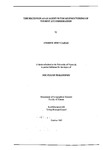Recession as an agent in the restructuring of tourist accommodation
| dc.contributor.author | Clegg, Andrew John | |
| dc.contributor.other | School of Geography, Earth and Environmental Sciences | en_US |
| dc.date.accessioned | 2011-05-11T14:14:07Z | |
| dc.date.available | 2011-05-11T14:14:07Z | |
| dc.date.issued | 1997 | |
| dc.identifier | Not available | en_US |
| dc.identifier.uri | http://hdl.handle.net/10026.1/392 | |
| dc.description.abstract |
Academic research into economic restructuring in the tourist industry has solely focused on the strategies adopted by large chain hotel companies and little attention has been paid to the strategies adopted by small scale, family-run accommodation establishments. This sector is particularly significant for traditional resort areas in the UK. For example, in Torbay, Devon (as in most seaside resorts), there is an absence of large chain hotels and small-scale accommodation establishment pl ay an integral role in the local tourism economy.Consequently, an understanding of the competitive pressures and restructuring strategies in this sector is essential in maintaining the long-term health and prosperity of the resort. The aim of this study is therefore to examine the restructuring process occurring in the hotel industry and, in particular, to focus on the restructuring strategies in the small-scale accommodation s ector. To do so, this study will draw on empirical data obtained from a number of sources including a commercial register, holiday accommodation brochures, planning applications and a major questionnaire survey of all serviced and self-catering accommodation establishments o perating in Torbay. This study will show that the restructuring process within the accommodation sector has been influenced by a combination of factors within the internal and external resort environment, including free market forces and public sector intervention. Restructuring strategies have concentrated on the development of ensuite and leisure facilities, although provision has been influenced by the structural and locational characteristics of accommodatione stablishments. A review of the entrepreneurial characteristics of the accommodation providers highlights the complexity of the decision-making process and that business strategy is influenced by highly personalised and individualistic operating characteristics that are difficult to isolate and analyse. Therefore, any policy directives to guide the future development of the resort will depend on dealing with individual managemen strategies and business objectives. | en_US |
| dc.language.iso | en | en_US |
| dc.publisher | University of Plymouth | en_US |
| dc.subject | Local tourism economy | |
| dc.subject | Management Commerce | |
| dc.subject | Sports | |
| dc.subject | Recreation | |
| dc.subject | Tourism | |
| dc.subject | Hotel industry | en_US |
| dc.title | Recession as an agent in the restructuring of tourist accommodation | en_US |
| dc.type | Thesis | |
| dc.identifier.doi | http://dx.doi.org/10.24382/4710 | |
| dc.identifier.doi | http://dx.doi.org/10.24382/4710 |
Files in this item
This item appears in the following Collection(s)
-
01 Research Theses Main Collection
Research Theses Main


